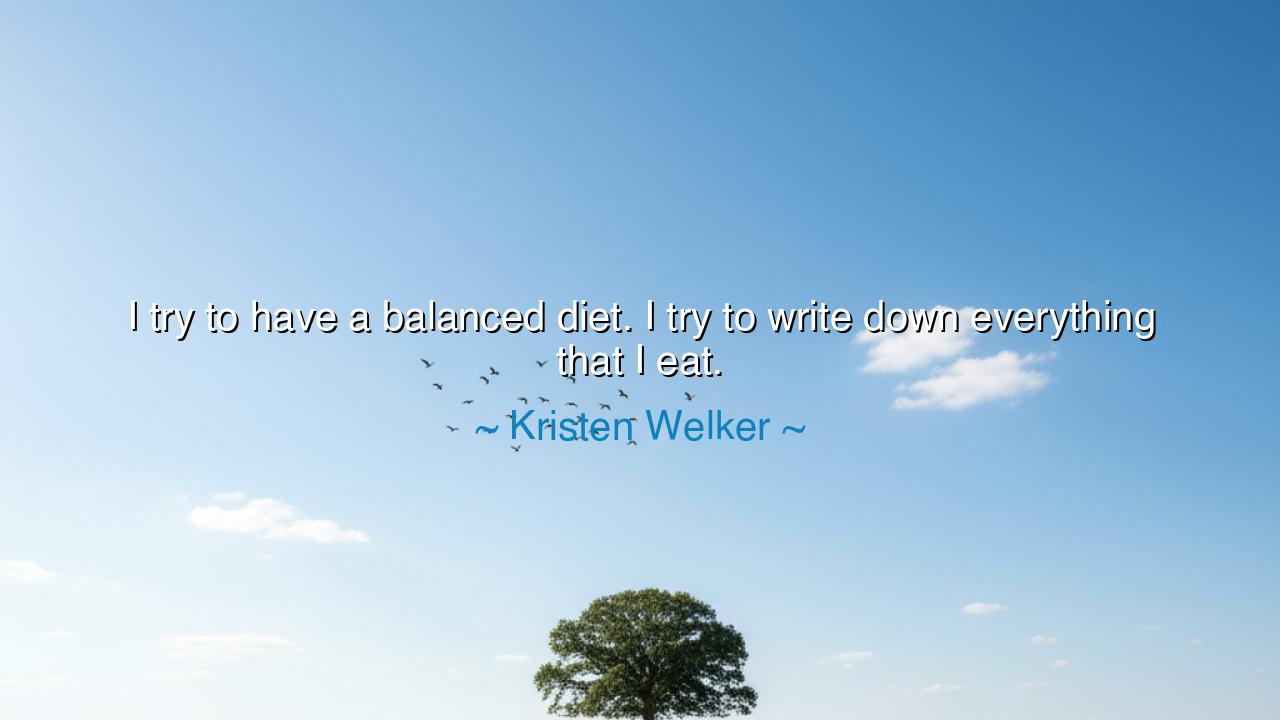
I try to have a balanced diet. I try to write down everything






Harken, O children of wisdom, to the words of Kristen Welker: "I try to have a balanced diet. I try to write down everything that I eat." These words, though simple in their expression, speak of a deeper wisdom, one rooted in the ancient truth that our health, our strength, and our spirit are shaped by the choices we make each day. To keep a balanced diet and to be mindful of what we consume is to walk in harmony with both the body and the world. It is an act of discipline, a commitment to understanding the delicate relationship between nourishment and well-being.
In the great teachings of the ancient Greeks, particularly the philosopher Aristotle, there was a deep reverence for the Golden Mean, the principle that virtue lies in moderation, in finding balance between extremes. Aristotle believed that health was not achieved through the avoidance of pleasure nor the overindulgence in it, but through a balanced approach to life’s pleasures and responsibilities. In this way, Welker’s words echo the ancient wisdom that true strength comes not from extremes, but from living in balance—from understanding what the body needs, and being mindful of what we choose to nourish it.
The practice of writing down what one eats is, in itself, a modern form of the ancient practice of reflection. In ancient Rome, the Stoics, like Seneca and Epictetus, were known for their practice of journaling, writing down their thoughts and actions as a way of gaining clarity and insight. This act of reflection allowed them to evaluate their lives, their choices, and their alignment with virtue. Similarly, by recording what we eat, we gain insight into our habits, allowing us to align our choices with our deepest values. It is an act of self-awareness, a recognition that true wisdom lies in understanding not just what we consume, but how it shapes our bodies and minds.
Consider the ancient warriors, who knew that their strength did not come from mere brute force, but from the balance of body and mind. The great samurai of Japan, though fierce in battle, were also men of discipline who understood the importance of nourishing both their physical bodies and their spirits. They ate with care, often adhering to a diet rich in rice, vegetables, and fish, sustaining their bodies for long periods of battle. Their inner peace and strength were a reflection of their outward discipline. So too must we nourish our bodies, understanding that balance and mindfulness in what we consume is the key to long-term strength and vitality.
This idea of nourishment as a holistic practice is one shared by the great healers of the ancient world, such as Hippocrates and the practitioners of ayurveda in ancient India. Hippocrates, the father of medicine, understood that the food we eat is not merely fuel, but medicine that has the power to heal or harm. Similarly, ayurvedic teachings hold that our health depends on the balance of the three doshas—vata, pitta, and kapha—and that the foods we eat can either promote harmony or create imbalance in our bodies. Welker’s approach of a balanced diet echoes this ancient understanding: to live in health, we must first understand the intricate balance of nourishment, rest, and activity that sustains us.
The lesson we must take from these reflections is clear: balance is the cornerstone of health, not only in what we consume but in how we live. Just as Welker writes down everything she eats to bring awareness to her choices, we too must become mindful of our habits and the impact they have on our lives. It is not enough to eat with abandon or rigidly deny ourselves. We must find a middle path, one that respects the needs of the body and honors the wisdom of moderation. This is the path to lasting vitality, to a life filled with energy, clarity, and purpose.
Practical action, O wise ones, calls us to cultivate mindfulness in our daily lives. Just as Welker practices reflection by writing down her meals, we too must take time each day to reflect on what we consume—not just in food, but in the thoughts, actions, and energies we take in. By becoming aware of what nourishes us and what drains us, we can choose to live in a way that promotes balance, health, and well-being. Let this wisdom guide you: true strength lies not in the extremes, but in the mindful and deliberate choices that bring balance to the body, the mind, and the soul.






AAdministratorAdministrator
Welcome, honored guests. Please leave a comment, we will respond soon